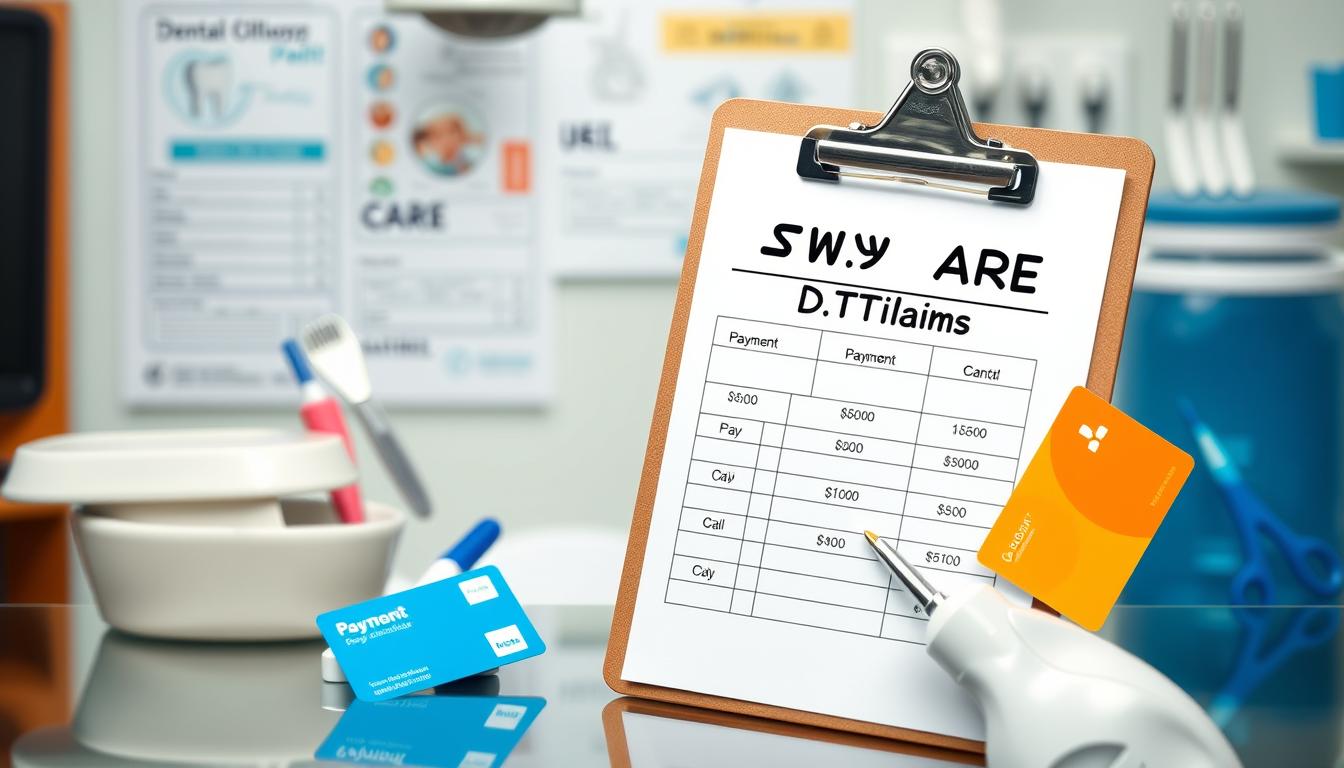Why Dont Dentists Take Insurance – Get the Facts Today
Imagine going to the dentist, ready for your appointment, but they don’t take your insurance. This is a common problem for many Americans looking for affordable dental care. But why do some dentists choose not to accept insurance? The reasons are complex, tied to the relationship between dentists and insurance companies.
As a patient, it’s natural to feel upset and unsure. Dental care is crucial for our health, and insurance is meant to help us get it. But the dental insurance world is more complicated than it seems.
In this article, we’ll explore why some dentists don’t accept insurance. We’ll also look at how this affects care quality and what other payment options are out there. By understanding these issues, you can better find the right dental care for you.
Key Takeaways
- Dental insurance networks can be complex and present challenges for dentists in terms of administrative costs and reimbursement rates.
- Many dentists feel that insurance companies’ involvement in patient care can negatively impact the quality of treatment.
- Choosing an out-of-network dentist can provide more flexibility and customized care, but may also result in higher out-of-pocket costs.
- Affordable dental care options exist, including payment plans, dental schools, and discount programs, that can help patients access the care they need.
- Understanding the limitations and exclusions of your dental insurance plan can help you make the most of your coverage and find the right provider for your needs.
Understanding the Complex Relationship Between Dentists and Insurance Companies
The bond between dentists and insurance firms is often debated. To grasp this, we must look at dental insurance’s history and how insurance networks work in dentistry.
The History of Dental Insurance in Healthcare
Dental insurance started in the 1950s to make dental care more affordable. Over time, many plans and policies have come out to meet different patient and dentist needs.
How Insurance Networks Operate in Dentistry
Insurance networks in dentistry work by partnering with certain dentists, called “in-network” dentists. These dentists agree to accept the insurance company’s set payment rates. This makes dental care cheaper for patients. But, it poses challenges for private dental practices, as they must deal with insurance policies and payment rates.
Key Challenges Dentists Face with Insurance Companies
- Navigating the ever-changing landscape of dental insurance policies and coverage limitations
- Dealing with insurance reimbursement rates that may not align with the actual costs of providing high-quality dental care
- Addressing the administrative burden and time-consuming processes involved in insurance claims processing
Dentists face many hurdles with insurance companies. These issues can affect the quality of care, patient happiness, and the practice’s financial health. It’s key for dentists and patients to understand this complex relationship to make better dental care choices.
Why Dont Dentists Take Insurance: Common Reasons Explained
In the complex world of healthcare, many dentists choose not to accept insurance. This leaves patients facing the challenges of finding out-of-network providers. Their reasons include financial, administrative, and patient care concerns.
One big reason is the low reimbursement rates from dental insurance. The dental fees covered by these plans often don’t match the real cost of care. This forces dentists to either accept less money or make patients pay more.
- Handling insurance claims and billing can be a huge burden for dental offices. It takes away from time and resources that could be spent on patient care.
- By not being in-network, dentists can make care decisions based on what each patient needs. They don’t have to follow strict insurance rules.
Some dentists also find that the costs of being in-network are too high. They have to constantly renegotiate contracts and follow strict rules. By opting out, they can focus on giving personalized care without the hassle.
| Reason | Explanation |
|---|---|
| Low Reimbursement Rates | Dental insurance plans often offer rates that don’t cover the cost of quality care. Dentists have to accept less money or make patients pay more. |
| Administrative Burden | Dealing with insurance claims and billing is complex and time-consuming. It takes away from time that could be spent on patient care. |
| Autonomy in Patient Care | By not being in-network, dentists have more control over patient care. They can tailor treatment to each patient’s needs without insurance rules. |
| Maintaining In-Network Status | The costs of keeping up with insurance contracts and rules can be too much. Sometimes, the benefits don’t outweigh the costs. |
While not accepting insurance can be tough for patients, it lets dentists focus on personalized care. They don’t have to deal with the hassle and financial limits of insurance plans.
The Financial Impact of Insurance Plans on Dental Practices
Dental insurance can greatly affect a practice’s finances. It involves administrative costs and differences in what insurance pays versus what treatment costs. Dentists must think about these impacts on their practice’s success.
Administrative Costs and Overhead Expenses
Insurance means dental offices need staff, software, and systems for claims and payments. These costs can eat up a lot of what the office makes.
Insurance Reimbursement Rates vs. Actual Treatment Costs
Insurance usually pays less than what treatment really costs. This makes it hard for offices to stay profitable, especially with complex treatments.
| Procedure | Actual Cost | Insurance Reimbursement |
|---|---|---|
| Dental Implant | $3,500 | $1,800 |
| Root Canal | $1,200 | $800 |
| Tooth Extraction | $300 | $150 |
Time Value of Insurance Processing
Handling insurance claims takes a lot of time. Staff must deal with paperwork and follow-ups. This takes away from time spent on patient care and making money.
The effects of insurance on dental practices are complex. Dentists need to understand the costs, payment differences, and time spent on insurance. This helps them decide how to handle insurance and find other ways to keep their business going.
How Insurance Networks Affect Quality of Dental Care
Insurance networks play a big role in how affordable dental care is. The relationship between dental practices and insurance companies affects the care patients get. This section looks at how insurance networks impact dental care and patient responsibility.
Insurance networks can limit treatments. Insurance companies might decide what procedures or materials dentists can use. This can mean dentists have to choose cost-saving options over what’s best for the patient.
Dealing with insurance claims and payments also takes time from dentists. This can make patient visits feel rushed and impersonal. It makes it hard for private dental practices to give the personal care they aim for.
The effect of insurance networks on dental care is big. Patients might face limited treatment choices, higher costs, and less personal care from their dentists.
| Comparison | In-Network Dentist | Out-of-Network Dentist |
|---|---|---|
| Treatment Options | Limited by insurance coverage | Greater flexibility in treatment options |
| Patient Responsibility | Higher out-of-pocket costs | Lower out-of-pocket costs, but may require more research |
| Personalized Care | Potentially rushed due to administrative burdens | Increased time and attention from the dentist |
As dental care changes, understanding the role of insurance networks is key. Patients can make better choices by knowing how these networks work. This helps them get the care they need and deserve.
“The true cost of dental care goes beyond the price tag. It’s about the quality of treatment and the patient-provider relationship.”
Understanding Out-of-Network Dental Providers
Patients often face a choice between in-network and out-of-network dentists. Knowing the differences helps you decide on dental care and costs.
Benefits of Choosing an Out-of-Network Dentist
Out-of-network dentists might offer more flexibility and specialized services. They could also have lower costs due to less overhead. This can lead to more competitive rates for their services.
Comparing In-Network vs. Out-of-Network Costs
| Metric | In-Network Dentist | Out-of-Network Dentist |
|---|---|---|
| Average Dental Costs | $150 per visit | $200 per visit |
| Insurance Coverage | 80% of approved costs | 50% of approved costs |
| Patient Out-of-Pocket Costs | $30 | $100 |
The table highlights that out-of-network dentists might charge more. Yet, patients could pay less out-of-pocket, depending on insurance and treatment.
Choosing between in-network and out-of-network dentists depends on your dental needs and budget. Review your insurance to find the best fit for your oral health and wallet.
Alternative Payment Options for Dental Care
People without insurance have many ways to pay for dental care. Options include flexible plans and discounted fees. These make dental services more affordable and accessible.
Dental Financing Plans
Dental offices often have financing plans. These plans let patients pay over time with little to no interest. This is great for those looking for affordable dental care without insurance.
Dental Membership Programs
Some dentists offer membership programs. These programs give discounts for an annual fee. They are a good choice for those with basic dental needs and no insurance.
Discounted Fee Structures
Some dentists offer special deals like cash discounts or fees based on income. This helps those without insurance or who are underinsured.
| Payment Option | Key Benefits | Potential Drawbacks |
|---|---|---|
| Dental Financing Plans |
|
|
| Dental Membership Programs |
|
|
| Discounted Fee Structures |
|
|
Exploring these options can help those without insurance get dental care. It’s key to compare and find the best option for your needs and budget.
Dental insurance can be tricky to understand. There are many plans, each with its own rules and what’s covered. Knowing your dental insurance policies and dental plans well helps you get the most out of your coverage. This way, you can get the dental care you need.
Types of Dental Insurance Plans
There are different dental insurance plans out there. Each has its own benefits and features. Here are a few common ones:
- Dental Health Maintenance Organizations (DHMOs): These plans cost less but you must see in-network dentists.
- Preferred Provider Organizations (PPOs): PPOs let you choose your dentist more freely but might cost more.
- Indemnity Plans: These plans give you the most freedom to pick a dentist but are usually pricier.
Understanding Coverage Limitations and Exclusions
It’s key to know what your dental insurance coverage includes and excludes. Most plans have yearly limits, deductibles, and specific coverage for different treatments. Knowing this helps you plan your dental care and avoid surprises.
Making the Most of Your Dental Benefits
To get the most from your dental insurance coverage, try these tips:
- Use preventive care like cleanings and check-ups to keep your teeth healthy and avoid expensive treatments later.
- Check your plan’s details to see what’s covered and how much, so you can plan your dental care wisely.
- Talk to your dentist about your dental insurance benefits to find affordable treatment options together.
By understanding your dental insurance policies and dental plans, you can get the care you need. And you’ll make the most of your dental insurance coverage.
Tips for Finding Affordable Dental Care Without Insurance
Getting dental care without insurance can seem hard. But, there are ways to get the care you need without spending too much. Look for local community health centers or federally qualified health centers. They often charge less or adjust fees based on your income.
Dental schools or clinics linked to dental universities are another good choice. They offer quality care at lower prices because they train dental students. Also, many private dentists have payment plans or discounts for those without insurance. It’s smart to ask about these when looking for a dentist.
Good oral health is key, no matter your budget. By using these options, you can get the dental care you need. This keeps your smile healthy and bright, even without insurance.
FAQ
Why don’t more dentists accept dental insurance?
Many dentists don’t accept dental insurance for good reasons. Insurance often pays less than what care costs, making it hard for dentists to stay afloat. The paperwork and claims process also take up a lot of time and resources. Plus, dentists might want to make their own treatment choices without insurance rules getting in the way.
How does the dental insurance landscape differ from medical insurance?
Dental insurance is different from medical insurance in many ways. Dental plans usually cover less and cost more out of pocket. They also have more exclusions. This makes it tough for people to get affordable dental care, even with insurance.
What are the financial implications of accepting dental insurance for dental practices?
Taking dental insurance can be tough on dental practices. The costs of handling insurance claims and the gap between what insurance pays and what care costs can hurt a dentist’s finances. Many dentists choose not to accept insurance and offer other payment options instead.
How does the choice of an in-network or out-of-network dentist impact a patient’s costs?
Choosing an in-network or out-of-network dentist affects how much you’ll pay. In-network dentists charge less because they’ve agreed to insurance rates. Out-of-network dentists might charge more, but some patients prefer them for better care or specialized treatments.
What alternative payment options are available for patients without dental insurance?
Patients without insurance have many ways to pay for dental care. Dentists offer financing plans, payment plans, or membership fees to help. You can also look into dental schools or clinics for cheaper services. Some dentists even give discounts for cash payments or flexible schedules.
How can patients maximize their dental insurance benefits?
To get the most from your dental insurance, know your plan well. Choose in-network dentists to save money. Regular checkups and preventive care are covered more, so take advantage of those. Also, use any benefits you have before the year ends to get the most value.
What strategies can patients use to find affordable dental care without insurance?
Without insurance, you can still find affordable dental care. Look into dental schools or clinics for discounts. Ask dentists about financing plans, payment plans, or cash discounts. Some dentists also offer membership or loyalty programs to help uninsured patients.
Akash verma s blog, where curiosity meets creativity! Sanjeet is a dedicated blogger with a passion for exploring diverse topics, from travel and technology to personal development and lifestyle. With a unique voice and engaging storytelling, he shares insights, experiences, and tips that inspire his readers to embrace life’s adventures.



